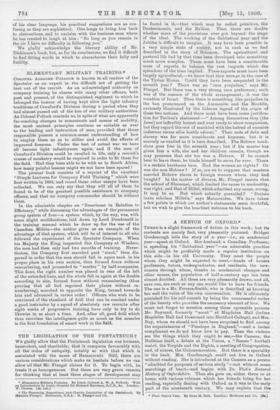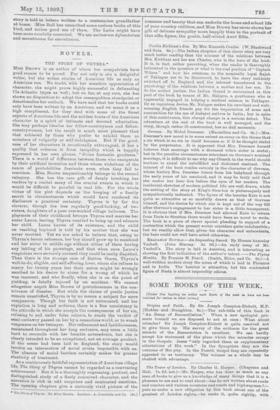A SKETCH OF OXFORD.*
THERE is a slight framework of fiction in this work ; but its contents are mainly fact, very pleasantly pictured. Bridget Goodenough tells the story of a year—i.e., an academical year—spent at Oxford. Her husband, a Canadian Professor, is spending his "Sabbatical year "—an admirable practice which might be profitably made a regular institution on this side—in his old University. They meet the people whom they might be expected to meet,—heads of houses professore, tutors, undergraduates, and residents, the new- comers through whom, thanks to academical changes and other causes, the population of half.a.century ago has been almost doubled. All these are very pleasantly drawn, and all, save one, are such as any one would like to have for friends. The one is a Mr. Ferrers-Smith, who is described as knowing too well the value of his own conversation. He is ultimately punished for his self-conceit by being the unsuccessful suitor of the beauty who provides the necessary element of love. We must not forget to mention among these agreeable persons Mr. Bayzand, formerly " scout " at Magdalen Hall (before Magdalen Hall had blossomed into Hertford College), and Mrs. • Nay, whom we should not have been surprised to find among the acquaintances of "Penelope in England,"--and a better compliment we do not know how to pay. Then the visitors see the things which they ought to see,—the Camera, the Bodleian itself, a debate at the Union, a " Soccer " football match, the Torpids and the Eights, a meeting of Congregation, aud, of course, the Commemoration. But there is a speciality in the book. Mrs. Goodenough could not live in Oxford without reading. She is introduced at the Camera as a person "admitted for purposes of serious study "—not without some searchings of heart—and begins with Dr. Plot's Natural History of Oxfordshire. Then she goes on, either there or at home, with various volumes which her friends bring for her reading, especially dealing with Oxford as it was in the early part of the nineteenth century. We may explain that the • Their Oxford Year. By Oona H. Ball. London: Methuen and Co. [6i.]
story is told in letters written to a centenarian grandfather at home. Miss Ball has unearthed some curious books of this kind, and makes good use of them. The Latin might have been more carefully corrected. We see animarum defunc forum and executionum for executionent.











































 Previous page
Previous page